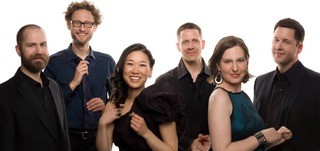|
Back
The Notes of Venice New York
Miller Theater, Columbia University
09/18/2014 -
Heart and Breath:
Amy Beth Kirsten: Colombine’s Paradise Theatre (New York premiere)
Richard Reed Parry: Duo for Heart and Breath
Bon Iver: Babys (arranged by Lisa Kaplan, New York Premiere)
Claudio Monteverdi: Lamento della ninfa (Arranged by Tim Munro, New York premiere)
Carlo Gesualdo: Moro, lasso al mio duolo (Arranged by Tim Munro, New York premiere)
Eighth Blackbird: Matthew Duvall (Percussion), Lisa Kaplan (Piano), Yvonne Lam (Violin and viola), Michael J. Maccaferri (Clarinets), Tim Munro (Flutes), Nicholas Photinos (Cello)
Creative Team: Mark DeChaizza (Director and Production Designer) Marry Ellen Stebbins (Lighting Designer), Sylvianne Shurman (Costume Designer), Rachel Damon (Production Stage Manager and Lighting Director), Ryan Ingebritsen (Sound Designer and Engineer)

M. Maccaferri, T. Munro, Y. Lam, M. Duvall, L. Kaplan, N. Photinos
(© Courtesy of Eighth Blackbird)
If dead people were capable of envy, Arnold Schoenberg would have been bitching like a fishwife after hearing Amy Beth Kirsten’s Colombine’s Paradise Theatre at Miller Theater last night.
“How come,” he would complain, “that my Pierrot Lunaire had the same characters, the same eccentric chamber orchestra, the same morbid sex, even the same expressionistic harmonies as this Kirsten piece? Yet in Pierrot, my singer only sings, and my players only play?
“I would have given up my whole dodecaphonic future if Pierrot had been staged with even an eighth as much inspiration as Eighth Blackbird staged Columbine.”
Arnold had a point. Columbine Theater was not a musical performance. Nor was it a 1950’s style “happening”. It was pure, almost classical Italian theater.
Amy Beth Kirsten was at pains to explain in the program that this was a variation on commedia dell’arte, that the eleven scenes formed “a haunted repetitive loop…lingering in a world between death and life.” Not only that, but the instruments themselves were Italian comedy characters. The piano was Columbine, Harlequin was (were) clarinet, flute and violin etc etc. But when the lights went on, all of that evaporated into the hallucinatory dream of the staging.
Not that it started with much glory. A few musty drapes thrown over chairs, a few ugly curtains tossed over unattractive metal towers. Even the beginning was less than mesmeric. Colombine (pianist Lisa Kaplan) was on the ground with Harlequin (flutist Tim Munro), she rose up and instead of notes we got heavy breathing. How old-fashioned!
Then the hallucinations started. The harlequins, with 17th Century masks, peered over Columbine, flutist physically seduced her with flute and song (Mr. Munro is counter-tenor as well as flute-player). In a scene I can only call “20-fingers of lesbian seduction”, Ms. Kaplan and Harlequin Yvonne Lam played piano, their notes coalescing, simulating crashing out seduction.
Even the stage setting came alive. What was under those metal poles? Literally hundreds of wooden blocks, cymbals, tubes, crazy percussion instruments. So many and so high that Pierrot (percussionist Matthew Duvall) had to stand on a ladder to play them.
Even the big circus-sized bass drum (played very very softly) took a different personality. Lugged across the stage, a duet is sung by Ms. Kaplan and the fingers on the drum. The bass is lit from behind to become a glowing moon–perhaps an homage to Pierrot’s lunaire!

A. B. Kirsten (© amybethkirsten.com)
It took a few seconds to stop thinking about the “linear storybook poem” in Ms. Kirsten’s program notes, though obviously we were watching 70-odd minutes of Columbine being wooed by two or three suitors. I had far far more fun listening to Eighth Blackbird artists run through the stage, pick up unusual instruments (a toy piano, a toy cello) and express their sounds in tandem with flute, clarinet, violin, voice, growls, shrieks, electronic laughter, breath and that tintinnabulation of bells.
The music was as expressionistic as Schoenberg’s ground-breaking classic, it could be ferocious, but it was also strangely beautiful. When Ms. Kaplan sits at the piano, the creatures of this subterranean world hovering about her, and sings in a voice without vibrato from the 16th Century poet Isabella Andreini, I was ready to cry.
At times, I felt that Columbine’s Paradise Theater might have worn out its welcome, that after an hour, they couldn’t do too much more. But I was always wrong. After all, Eighth Blackbird has always been known as more than one of the prime new music ensembles, up there with Argento. Like the original Venetian commedia dell’arte, each player not only plays their own instruments, they can obviously dance, sing, act and, yes, growl.
We call it multitasking. The Venetians called it theater.
While Ms. Kirsten’s work was the major piece, this, the opening night of Miller Theaters season, started with four other works , somehow tied together. The first was Duo for Heart and Breath with violist Yvonne Lam and pianist Lisa Kaplan. This was a very minimal minimalist work which depended (so I read) on “their heartbeats through a stethoscope.” Connected to this was an orchestration of a Gesualdo madrigal, and attached to this was Babys, which blended into that musical landscape.
Most important of all, though, was an orchestration of Claudio Monteverdi’s Lamento della ninfa, by Tim Munro. Like the famous Webern orchestration of Bach, one initially enjoyed the different notes played on different instruments. But then one realized that nobody every knew which instruments Monteverdi had in mind with his operas, that he was open for any innovation.
And that Monteverdi’s thoughts were the thoughts of Ms. Kirsten’s work as well. Monteverdi was your typical madrigalist/court composer until he came to Venice. Venice in the 17th Century was the most innovative city-state in Europe, and Monteverdi loved the challenges.
In fact, though we know him now as a “composer”, he was a man of the theater, an early Baroque Sondheim. Methinks he would have loved the orchestration of his vocal lament–and he wouldn’t have been the least bit startled at the music or movements of her Columbine’s Paradise Theatre. He, as we, would have become viscerally vitally excited both by its actions, inspirations and audacity.
Harry Rolnick
|